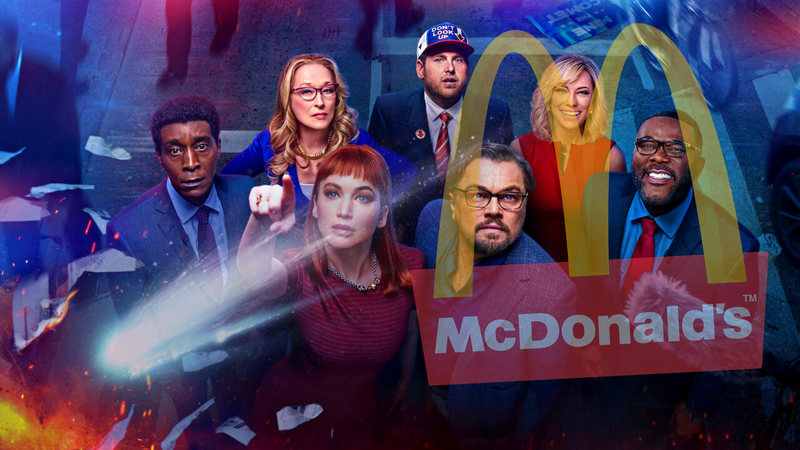Film Review: Don’t Look Up
In December of 2021, the dystopian comedy film, Don’t Look Up, was released on Netflix. Don’t Look Up, which was written, produced, and directed by Adam Mckay, is in the top five watched films on Netflix charts as of January 1, 2022. Accumulating about 321.5 million viewing hours so far according to Netflix, and grossing $764,829 in the box office, the satirical movie is one of the most talked about films of the New Year.
Viewer of the film, Rema Maarouf comments, “I found it interesting and similar to society today.”
This film is already getting special attention not only for its ensemble cast, but for its dystopian image of a society not too different from America today.
In the beginning of the film, two scientists, Kate Dibiasky and Randall Mindy, played by Jennifer Lawrence and Leonardo DiCaprio, discover a giant comet is soon to encroach on Earth, wiping out every living organism on the planet.
It is Dibiasky and Mindy’s mission to inform the media of this fate and find a solution from the government and the military.
The scientists are frequently dismissed while trying to inform the public of this awaiting danger. This is a greatly emphasized theme present in both the film and our current society.
We witness the more superficial news like celebrity gossip, leaked scandals, and other useless information getting more attention than this deadly comet, or other serious threats, like climate change and Covid-19.
Featured in an Entertainment Weekly interview, Adam Mckay speaks to the lack of recognition and significant attention that serious news topics get and mentions the connection that journalist David Sirota had made.
Mckay says, “We were both just like ‘Can you believe that this isn’t being covered in the media?’…and Sirota just offhandedly said, ‘It’s like a comet’s headed to Earth and it’s gonna destroy us all and no one cares.’”
We see this in scenes like the morning talk show parody, “The Daily Rip” where the two enthusiastic, and almost fake hosts, played by Tyler Perry and Cate Blanchett, are constantly making witty remarks and engaging in banter with each other after hearing this chilling news. So much so that Dr. Dibiasky breaks down on National television, creating a viral internet meme, which catches more eyes than the actual and consequential news.
English and film teacher, Miss Green, explains her take on the comedic aspects and intentions of the film.
Green explains, “Overall, the writers and director do a phenomenal job integrating a multitude of film techniques into the movie in order to emphasize the emotions and actions of the characters beyond which we usually see in a typical comedy. The movie uses comedy to give us an eye-opening, front row seat to the realities of our world plagued by greed and corruption.”
Later, we meet the incompetent and scandalous President Orlean, played by Meryl Streep, who portrays a celebrity president obsessed with lying to her almost comedically loyal followers. We are introduced to her as their movement gains more attention from the general public.
Despite her recent acts, President Orlean wanted to address this life-threatening issue. With a plan to confront the comet with a counterattack. The scientists finally felt proud and hopeful that this issue could be solved.
When the mission was aborted for a “better” plan that entailed enabling the comet to continue hurtling towards earth, though the materials within it would be extracted and sold for trillions.
The government officials, mainly Orlean and her son, also the Chief of Staff, Jason Orlean, were very much in favor of this proposal.
It is seen throughout many different reviews that the true message of the film is to resemble the end of the human race through many possible causes, predominantly climate change.
The name Don’t Look Up arose in the film when scientists Mindy and Dibiasky created the social media tag: #JustLookUp to bring awareness to the comet. To combat this movement, Orlean and Isherwell create #DontLookUp, to draw attention to their false agenda.
These followers display a false-confident and violent crowd as shown at one of President Orlean’s rallies.
I noticed the odd similarities between the crowd of Orlean’s supporters and the usual science-deniers of today are uncanny. The only difference is the topic, which is being protested, mentioned before, if you replace this comet with climate change, you will notice an identical society seen in real life.
Many of these comet-deniers spout fake and conspiracy-driven nonsense that we can connect to the conspiracy theorists of today. We can see this science-denying phenomenon through social media both in the film and in our society, networks such as Parlor can support these conspiracies.
The film, in the most serious light, gives a view into the common behavior of the government and society when faced with a threat that could lead to the end of the human race.
Specifically, the priority of profits and capitalism over public safety perpetuated by the government in the film.
It can be seen that the actions of society in the film, no matter how dramatic and stretched they might be to some, might just speak to the true essence of society today.
Your donation will support the student journalists of Foran High School. Your contribution will allow us to purchase equipment and cover our annual website hosting costs.

Hi my name is Gracie! I'm Co-Editor-in-Chief of the Mane Street Mirror and have been in journalism for four years. I'm also a part of Key Club and the...








Mrs. Dove | Jan 31, 2022 at 7:28 AM
Great article, Gracie! I really enjoyed it!